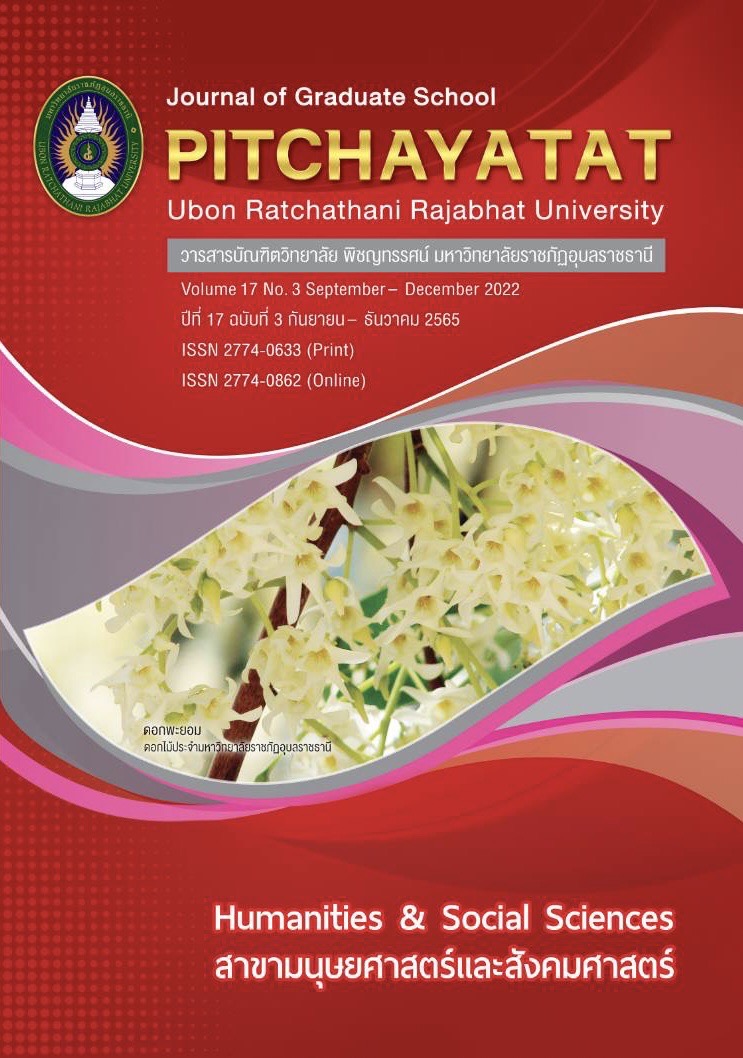การจัดการเรียนรู้ตามแนวคิดสะเต็มศึกษา ตามขั้นตอนการจัดการเรียนรู้วิทยาศาสตร์แบบ 5C ที่มีต่อผลสัมฤทธิ์ทางการเรียนฟิสิกส์และความสามารถ ในการแก้ปัญหาของนักเรียนชั้นมัธยมศึกษาปีที่ 4
คำสำคัญ:
การจัดการเรียนรู้วิทยาศาสตร์แบบ 5C , สะเต็มศึกษา , ความสามารถในการแก้ปัญหาบทคัดย่อ
การวิจัยในนี้มีวัตถุประสงค์เพื่อ 1) พัฒนาการจัดการเรียนรู้ตามแนวคิดสะเต็มศึกษา ตามขั้นตอนการจัดการเรียนรู้วิทยาศาสตร์แบบ 5C 2) ศึกษาผลสัมฤทธิ์ทางการเรียน และความสามารถในการแก้ปัญหาของนักเรียนที่ได้รับการจัดการเรียนรู้ตามแนวคิดสะเต็มศึกษา ตามขั้นตอนการจัดการเรียนรู้วิทยาศาสตร์แบบ 5C กลุ่มเป้าหมาย ได้แก่ นักเรียนชั้นมัธยมศึกษาปีที่ 4/3 โรงเรียนสาธิตมหาวิทยาลัยมหาสารคาม (ฝ่ายมัธยม) จำนวน 33 คน เครื่องมือที่ใช้ในการวิจัย ประกอบด้วย 1) แผนการจัดการเรียนรู้ 2) แบบทดสอบผลสัมฤทธิ์ทางการเรียน 3) แบบวัดความสามารถในการแก้ปัญหา รูปแบบการวิจัย ผู้วิจัยใช้แบบการวัดผลหลังเรียนเพียงอย่างเดียว สถิติที่ใช้ในการวิเคราะห์ข้อมูล ได้แก่ ร้อยละ ค่าเฉลี่ย และส่วนเบี่ยงเบนมาตรฐาน
ผลการวิจัยพบว่า
- การจัดการเรียนรู้ตามแนวคิดสะเต็มศึกษา ตามขั้นตอนการจัดการเรียนรู้วิทยาศาสตร์แบบ 5C มีขั้นตอนในการจัดการเรียนการสอนในแต่ละแผนประกอบด้วย 5 ขั้นตอน คือ 1) ขั้นสร้างความเชื่อมโยง 2) ขั้นสร้างความขัดแย้งทางความคิด 3) ขั้นการปฏิบัติ 4) ขั้นเปรียบเทียบและสรุป และ 5) ขั้นสร้างสรรค์ โดยมีการแทรกแนวคิดสะเต็มศึกษาแต่ละตัว ได้แก่ วิทยาศาสตร์ เทคโนโลยี วิศวกรรมศาสตร์ และคณิตศาสตร์ เข้าไปในแต่ละขั้นการสอน
- ผู้เรียนที่ได้รับการจัดการเรียนรู้ตามแนวคิดสะเต็มศึกษา ตามขั้นตอนการจัดการเรียนรู้วิทยาศาสตร์แบบ 5C ทั้งหมด 33 คน มี คะแนนผลสัมฤทธิ์ทางการเรียนเฉลี่ย 26.45 จากคะแนนเต็ม 30 คะแนน คิดเป็นร้อยละ 88.16 ของคะแนนทั้งหมด และมีคะแนนความสามารถในการแก้ปัญหาเฉลี่ย 25.50 จากคะแนนเต็ม 30 คะแนน คิดเป็นร้อยละ 85.00 ของคะแนนทั้งหมด
เอกสารอ้างอิง
ฉันชัย จันทะเสน. การพัฒนารูปแบบการจัดการเรียนรู้วิทยาศาสตร์เพื่อส่งเสริมการคิดอย่างมีวิจารณญาณของนักเรียนชั้นมัธยมศึกษาตอนปลาย. ปริญญาปรัชญาดุษฎีบัณฑิต มหาวิทยาลัยมหาสารคาม, 2559.
ณัฐพงศ์ มณีโรจน์. การพัฒนากิจกรรมการเรียนรู้แบบสืบเสาะหาความรู้ตามแนวคิดสะเต็มศึกษา ชั้นมัธยมศึกษาปีที่ 4. ปริญญาการศึกษามหาบัณฑิต มหาวิทยาลัยมหาสารคาม. 2560.
นิภาพร ช่วยธานี และคณะ. “การส่งเสริมทักษะการแก้ปัญหาทางสะเต็มของนักศึกษาปริญญาตรีโดยใช้รูปแบบการจัดการเรียนรู้สะเต็มศึกษาที่บูรณาการการสร้างข้อโต้แย้ง (6E+A) ,” มหาจุฬานาครทรรศน์. 6, 10 (มกราคม 2562): 5179–5192.
บุญชม ศรีสะอาด. การวิจัยเบื้องต้น. พิมพ์ครั้งที่ 6. กรุงเทพฯ: สุวีริยาสาส์น, 2545.
พรทิพย์ ศิริภัทราชัย. “STEM Education กับการพัฒนาทักษะในศตวรรษที่ 21,” ExecutiveJournal. 33, 2, (2556): 49–56.
เลขาธิการสภาการศึกษา, สำนักงาน. แผนการศึกษาแห่งชาติ พ.ศ. 2560-2579. กรุงเทพฯ: พริกหวานกราฟฟิค, 2560.
วิชาการ, กรม. หลักสูตรการศึกษาขั้นพื้นฐานพุทธศักราช 2544. พิมพ์ครั้งที่ 2. กรุงเทพฯ: กระทรวงศึกษาธิการ, 2545.
ส่งเสริมการสอนวิทยาศาสตร์และเทคโนโลยี, สถาบัน. คู่มือเครือข่ายสะเต็มศึกษา. ออนไลน์ 2557. จาก http://www.stemedthailand.org/wp-content/uploads/2014/08/STEM_Manual.pdf
สุธาทิพย์ ขาวทอง. “ผลของการพัฒนาชุดกิจกรรมการเรียนรู้วิทยาศาสตร์ตามแนวสะเต็มศึกษา เพื่อส่งเสริมความสามารถในการแก้ปัญหาของนักเรียนชั้นประถมศึกษาปีที่ 6,” ครุศาสตร์ มหาวิทยาลัยราชภัฏมหาสารคาม, 18, 1 (มกราคม-มิถุนายน2564)
Anderson, H.O., H. Harty and K.V. Samuel. “Nature of Science. 1969 and 1984: Perspectives of Science Teachers,” School Science and Mathematics. 86, 1 (January 1986): 43-50.
Ceylan S. and Z. Ozdilek. “Improving a Sample Lesson Plan for Secondary Science Courses within the STEM Education,” Procedia–Social and Behavioral Sciences, 177 (2015): 223-228.
Hartmen, H. J. “Metacognition in Teaching and Leaning: An Introduction,” Instructional Science. 2,4 (October 2001): 173-201.
Hewson, P.W. and M.G. Hewson. “An Appropriate Conception of Teaching Science: A View From Studies of Science Learning,” Education. 72,5 (October 1988): 597-614.
Joyce, B., M. Weil and E. Calhoun. Models of Teaching. 7th ed. Boston: Allyn & Bacon, 2004.
ดาวน์โหลด
เผยแพร่แล้ว
รูปแบบการอ้างอิง
ฉบับ
ประเภทบทความ
สัญญาอนุญาต
ลิขสิทธิ์ (c) 2022 วารสารบัณฑิตวิทยาลัย พิชญทรรศน์ มหาวิทยาลัยราชภัฏอุบลราชธานี

อนุญาตภายใต้เงื่อนไข Creative Commons Attribution-NonCommercial-NoDerivatives 4.0 International License.
บทความทุกเรื่องได้รับการตรวจความถูกต้องทางวิชาการโดยผู้ทรงคุณวุฒิภายนอกอย่างน้อย 3 คน ความคิดเห็นในวารสารพิชญทรรศน์เป็นความคิดเห็นของผู้นิพนธ์มิใช่ความคิดเห็นของผู้จัดทำ จึงมิใช่ความรับผิดชอบของวารสารพิชญทรรศน์ และบทความในวารสารพิชญทรรศน์สงวนสิทธิ์ตามกฎหมายไทย การจะนำไปเผยแพร่ต้องได้รับอนุญาตเป็นลายลักษณ์อักษรจากกองบรรณาธิการ





